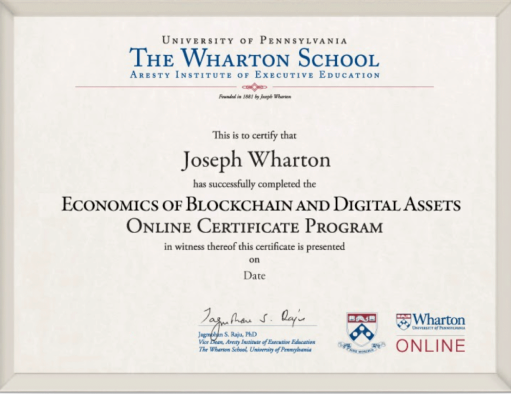
The metaverse is still somewhat of a concept without defined borders. It consists of true virtual reality worlds that use headsets and immersive hardware. However, the metaverse can be as simple as a smartphone application that aids with visualizing or connectivity. Other defining points of the metaverse lie along this spectrum.
Because the definition of the metaverse is so broad, there are several applications for the metaverse. Companies are currently looking at the metaverse as an opportunity for future occupancy, growth, and marketing. With this in mind, there are a few roles that are guaranteed to benefit from enrolling in a metaverse program or metaverse course.
First, financial advisors and financial consultants should be first in line to take a metaverse course. With the metaverse will come an entirely new economy and a new way of exchanging value. Financial advisors and consultants must be ready to help clients navigate this financial frontier without running afoul of obvious problems. Likewise, CFOs must have a working knowledge of the metaverse and the future metaverse economy. The metaverse will be the future of financial transactions and CFOs must understand the implications for their businesses.
There is no universally accepted definition of the metaverse, though some common characteristics exist among the different definitions. The metaverse essentially consists of a virtual environment where individuals can interact with the environment and each other in a free-flowing manner. Applied to finance, one can begin to imagine digital banks and parallel digital economies that may emerge from the metaverse.
Metaverse programs are scarce and almost all come from uncredentialed or crowd-sourced origins. When evaluating where to take a metaverse program, one of the first things to consider is the credentials and credibility of the institution. As a general rule of thumb, avoid paying for courses that allow anyone to upload content without any sort of peer-review process. The same academic rigor that characterizes the rest of Wharton’s education was also applied to the metaverse program, making it a leading course in this growing field.
Indeed, a metaverse program, especially one as rigorous as Wharton’s, isn’t for everyone. However, Wharton created the Business in the Metaverse Economy program with financial advisors, consultants, and CFOs in mind.
Financial advisors and consultants will be expected to help clients navigate through investments and financial planning within the metaverse. Currently, the metaverse appears mainly as an agglomeration of games and virtual spaces. However, in the near future, the metaverse will become a financial hub and the future of digital banking.
The metaverse represents the nexus of transactions in the future. Just like financial advisors and consultants, CFOs need to be aware of new developments and regulations that influence the transactions in the metaverse. As the future of digital banking, CFOs must learn how to manage lines of credit, investments, and accounting on a metaverse platform.
Cryptocurrencies and other digital assets currently drive the metaverse economy. However, as the metaverse economy matures and extends beyond the metaverse into reality, its influence will become greater. Many financial institutions and experts view the metaverse as the future of digital banking and perhaps even as an essential financial innovation.
Currently, NFTs are part of the metaverse economy. These digital assets exist on the blockchain and are accounted for with decentralized ledger technology. Their sale and purchase are effectuated mainly through digital asset exchanges. However, because they live on the blockchain, NFTs can be used to keep track of physical asset ownership, such as real estate.
Cryptocurrencies are the money that drives the metaverse economy and forms the bridge between the physical world and the digital metaverse. Real value can be stored and transferred with cryptocurrencies, and as they become more popular, investors become more interested. Therefore, financial advisors, consultants, and CFOs should all be prepared to understand the intricacies of cryptocurrencies and their use as a money and investment vehicle.
Banking in the real world has become a stale and sterile event that few people look forward to. Banks hope to use the metaverse to make the banking experience more personalized and friendly. Instead of dealing with automatic text messages and smartphone applications, customers will be able to interact with real humans in a customized way.
Several banks have already taken the initiative to grow and form part of the metaverse. Most notably, JPMorgan Chase has occupied a corner of the metaverse with a program called Onyx, which is a virtual banking lounge. Customers can initiate cross-border payments, store money, and invest in financial assets.
Other banks, such as HSBC, have also dipped their toes into the metaverse to engage with different customer bases. Bank of America has also started using augmented reality in over 4,300 different locations across the country. This use case is particularly noteworthy since most of the metaverse will likely exist in augmented reality rather than virtual reality. The technology was implemented to help new employees receive training for complex problems and interactions they may have with different customers. The move aims to reduce employee turnover and increase customer satisfaction with the services provided by Bank of America.
When considering which metaverse course to take, it is essential to note that very few options are available and even fewer are reputable and worthwhile. The technology is so new that many universities simply have not had the time or resources to dedicate to creating a metaverse program. However, the metaverse’s novelty cannot be conflated with its utility. Many companies are launching R&D programs to enter the metaverse and need qualified professionals to spearhead the efforts.
The Wharton School has stepped in to fill the space with its executive education program, Business in the Metaverse Economy. The course covers case studies from finance, retail, advertising, entertainment, and other sectors to help students understand the potential in the metaverse. Participants will learn about the current state of the metaverse, active builders, and the economic and technological factors that will drive future development. For more information or to enroll in the metaverse program, visit our information page.
This article is for marketing purposes only and does not intend to represent the opinions of the program.


